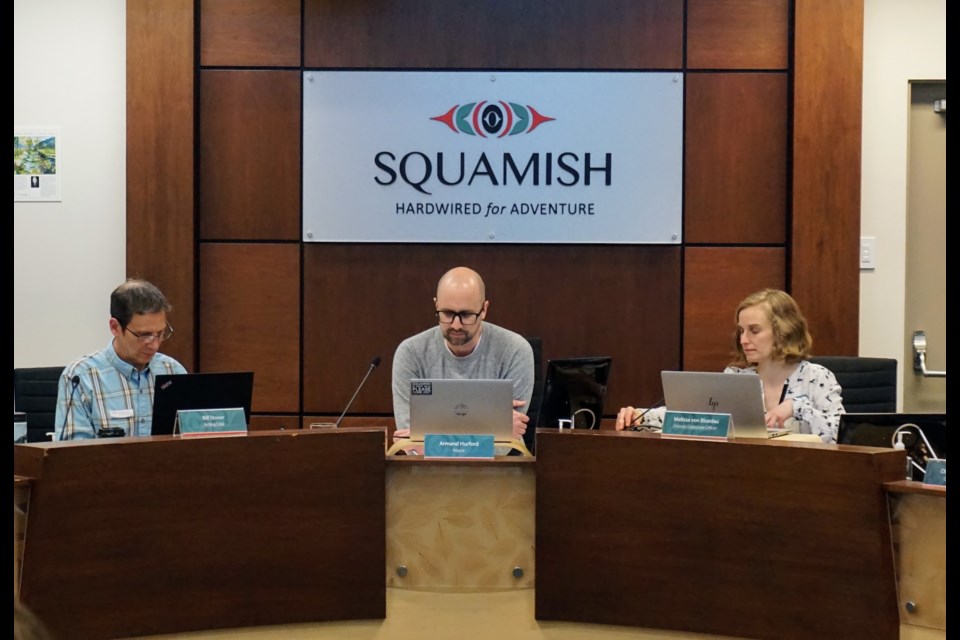Squamish council defeated the temporary use permit application for Woodfibre LNG’s worker accommodation dubbed the floatel, though it doesn’t seem quite over just yet.
A week after a public hearing at Brennan Park Recreation Centre that saw at least 200 attendees, Squamish council ultimately defeated issuing a one-year temporary use permit (TUP) with an option for renewal for the floatel from Woodfibre LNG (WLNG) by a vote of 3-4. Councillors Lauren Greenlaw, Chris Pettingill, Jenna Stoner and Andrew Hamilton were the votes in opposition at the April 30 meeting.
However, the process wasn’t so simple, and it was noted several times that via the procedure bylaw, any of those who voted in the majority of the motion or the mayor may return a motion for reconsideration within 30 days.
About 25 people were in attendance at the meeting, some holding signs denouncing the WLNG project and several WLNG representatives. The floatel is a refurbished ship, the MV Isabelle, that would house approximately 600 workers. It was proposed to be moored at the WLNG site in Howe Sound, about seven kilometres away from Squamish’s downtown.
Two motions proposed, neither passed
At the start of the meeting, a motion to reject the TUP application was brought forward. Those on council ultimately defeated the motion to reject by a vote of 3-4, with Mayor Armand Hurford and councillors John French, Andrew Hamilton, and Eric Andersen opposed.
During this motion, Greenlaw said she still had too many concerns to approve the floatel.
“I still have significant concerns pertaining to the floatel that must be addressed prior to any consideration of issuance in the interest of community safety,” she said.
Stoner said there was not enough information to support the permit application as is.
Hamilton noted that he wanted to hear from colleagues before making a decision, and also relayed some concerns.
Ultimately, the vote to reject the application failed.
Notably, within the TUP, WLNG would have been required to pay a $2 million security deposit. Hamilton asked if they could increase that amount to $10 million, but the senior director of community development, Jonas Velaniskis, said doing so would trigger the application to go back to a public hearing, and therefore, they could not simply change that amount at this time.
Next, a motion was brought forward to issue a one-year TUP with an option to renew for up to three years.
Hurford said that this option would allow a trial period of sorts, where more information would be understood and to see the plans from WLNG implemented. By only issuing for one year, he said council could ultimately decide not to keep using the floatel, if needed.
“Trust needs to be earned,” he said of WLNG.
In support, French reiterated that the project is currently under construction and has the approval of the Squamish Nation, and federal and provincial governments.
“Denying this permit is not going to stop the project that's currently under construction,” he said.
When comments came back around to Hamilton, he said the current security deposit was too low for his approval.
“The size of the security deposit is a concern to me. I think we have a responsibility to ensure some accountability for our community,” he said.
The motion to issue a one-year TUP subsequently failed.
What’s next?
The failure of the one-year TUP motion means the application was defeated.
It was noted that those in majority vote—Greenlaw, Pettingill, Stoner and Hamilton—or Mayor Hurford could bring the motion back for reconsideration within 30 days via the procedure bylaw. There was some back-and-forth between District of Squamish staff and council about what that meant, but no further motions were offered on April 30 on the matter.
Pettingill asked if sticking with the decision prevented the council from having a committee discussion about a solution, and Hurford said they would be allowed to have such a meeting.
Hurford said council was “likely to hear more about” the matter going forward.
The –°¿∂ ”∆µ asked the WLNG representatives who were in attendance at the meeting for a comment, but they did not offer one.
Tracey Saxby, the executive director of My Sea to Sky, an organization that has campaigned against the project for years, commended the council for its decision, though she said she was still processing what happened.
“I’m really pleased that council has taken the time to reconsider this application and recognize that a lot more information is required before this floatel TUP can be approved,” she told The –°¿∂ ”∆µ after the meeting.
View the meeting on .
The –°¿∂ ”∆µ reached out to Squamish Nation for comment and will update this story as soon as we hear back.




